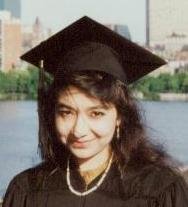Aafia Siddiqui
Pakistani-American neuroscientist and terrorist (born 1972)
Aafia Siddiqui (Urdu: عافیہ صدیقی; born 2 March 1972) is a Pakistani neuroscientist. She was convicted of multiple felonies. She was born in Karachi, Sindh, Pakistan. She is serving an 86-year sentence at the Federal Medical Center, Carswell in Fort Worth, Texas, United States.[4]
Aafia Siddiqui | |
|---|---|
عافیہ صدیقی | |
 | |
| Born | 2 March 1972 |
| Nationality | Pakistani[1][2] |
| Alma mater | Massachusetts Institute of Technology (BS) Brandeis University (PhD) |
| Height | 5 ft 4 in (1.63 m) |
| Board member of | Institute of Islamic Research and Teaching (President) |
| Criminal status | Held in the FMC Carswell, Fort Worth, Texas, United States |
| Spouse(s) |
Amjad Mohammed Khan
(m. 1995; div. 2002)allegedly Ammar al-Baluchi, also known as Ali Abdul Aziz Ali (February 2003 – present)[3] |
| Children | 3 including Mohammad Ahmed |
| Criminal charge | Attempted murder, assault with a deadly weapon |
| Penalty | Convicted; sentenced to 86 years in prison |
| Scientific career | |
| Fields | Neuroscience |
| Thesis | Separating the components of imitation (2001) |
| Doctoral advisor | Robert Sekuler |
She is viewed by some people in Pakistan as the "national symbol of honor".[5] The Pakistani news media have called her trial a "farce" and very politically motivated.[6]
References
change- ↑ "Pakistani Diplomats Visit Woman Detained in New York". WNYC. 10 August 2008. Archived from the original on 13 July 2015. Retrieved 19 April 2011.
- ↑ Emerson, Steven (2006). Jihad incorporated: a guide to militant Islam in the US. Amherst, NY: Prometheus Books. ISBN 1591024536.
- ↑ Schmitt, Eric (5 August 2008). "Pakistani Suspected of Qaeda Ties is Held". The New York Times. Archived from the original on 2 October 2018. Retrieved 7 October 2018.
- ↑ "Dr Aafia Siddiqui doesn't want to return: FO spokesperson". Dunya News. Archived from the original on 10 May 2019. Retrieved 10 May 2019.
- ↑ "US protesters demand release and repatriation of Aafia Siddiqui".
- ↑ Yusuf, Huma (4 February 2010). "'Lady Al Qaeda': Pakistan reacts to Aafia Siddiqui conviction in US court". The Christian Science Monitor. Archived from the original on 13 May 2010. Retrieved 13 May 2010.